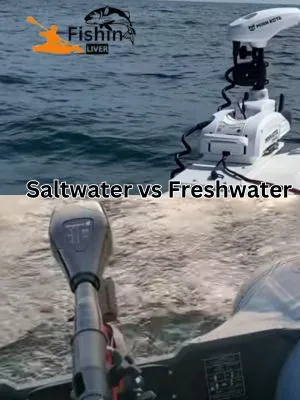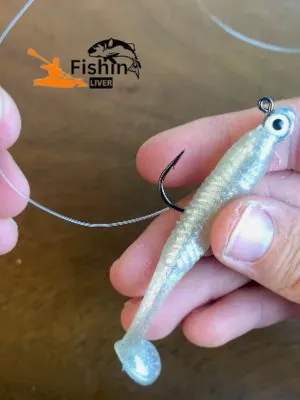Can You Use a Freshwater Trolling Motor in Saltwater?

A trolling motor is an important tool that is essential for fishing anglers and boating enthusiasts.
These motors are designed for freshwater and saltwater applications, providing quiet and efficient propulsion.
Many anglers question whether a freshwater trolling motor can be used in saltwater.
The answer is yes, but it could be better. But some reasons prevent you from doing so.
Due to saltwater’s corrosive nature, freshwater trolling motors are generally not recommended for saltwater use.
However, there are instances where anglers have occasionally had to use a freshwater trolling motor in saltwater environments, although there are better practices than this.
But if you want to do this, you must follow some precautions.
In this article, we discuss how a freshwater trolling motor can be used in saltwater, but there are some challenges and tips to consider.
Difference Between Saltwater vs Freshwater Trolling Motors
Trolling motors are electric motors that are used on boats for precise movement while fishing.
When choosing between a saltwater and a freshwater trolling motor, there are a few key differences :
Corrosion Resistance: Saltwater trolling motor components are designed to resist corrosion.
The freshwater trolling motor is designed with low corrosion resistance because freshwater has less salinity.
Saltwater trolling motors have special coatings, seals, and materials that help protect them from corrosion.
A freshwater trolling motor is therefore designed for less demanding environments. Freshwater is not made of heavy-duty construction.
Durability: A saltwater trolling motor can withstand harsh saltwater conditions.
A saltwater trolling motor has plenty of durability and provides the power to fight difficulties.
Freshwater trolling motors do not require durability and corrosion protection, so they are designed to be lightweight. Smaller boats or kayaks may benefit from this.
Sealed Components: Sealed components are used in saltwater trolling motors. To protect the internal parts of the motor from saltwater damage.
The longevity and performance of the motor depend on these components.
Most saltwater trolling motors come with stainless steel hardware.
They are more resistant to corrosion than other materials. Freshwater trolling motors are built with simple components.
The freshwater trolling motor is also made of stainless steel.
Cost: Freshwater trolling motors are less expensive because their construction and materials differ from saltwater trolling motors.
Saltwater trolling motors are expensive because they are made of high-quality construction.
Considerations for Both
Choose a powerful trolling motor to handle your boat’s size and varying water conditions.
Whether in saltwater or freshwater, choose the best trolling motor. Various control options are available for saltwater and freshwater trolling motors, including hand control, foot control, and remote control.
Your fishing preferences and style should be taken into consideration when selecting features.
What are the challenges facing freshwater trolling motors in saltwater?

The biggest challenge when using a freshwater trolling motor in saltwater is the increased risk of corrosion. Saltwater causes rapid deterioration of motor components.
Those tools deteriorate quickly in saltwater and are not designed to resist salt corrosion.
Saltwater can corrode metal parts and damage electrical components.
Due to this trolling, motor performance has to be compromised. Freshwater motors need more safety features.
Freshwater motors can wear out faster than saltwater motors due to the mismatch between the materials used in freshwater motors and the corrosive nature of saltwater.
Freshwater trolling motor features are not designed to withstand prolonged exposure to saltwater.
Damaged trolling motor wiring due to saltwater affects overall performance.
Tips for Using a Freshwater Trolling Motor in Saltwater
When you use the trolling motor in saltwater, rinse it with clean water afterward. Washing it removes salt residue and helps reduce corrosion.
If you use a saltwater trolling motor for saltwater and a freshwater trolling motor for freshwater, it will be better and cause less trouble. I am giving you this suggestion to avoid unnecessary expenses.
You should consider all components, including the motor, propeller, and mounting brackets.
Pay extra attention to where metal parts interact. Take care of your trolling motor to avoid damage.
Ensure loose bolts are tightened, worn-out parts are replaced, and electrical problems are addressed immediately.
A freshwater trolling motor is cheaper than a saltwater motor. A saltwater trolling motor is the best, but you can use a freshwater trolling motor in saltwater if the need arises.
The primary function of a freshwater trolling motor is to operate in saltwater.
If you intend to use your trolling motor in the water often, buy a saltwater trolling motor that will be more durable.

Conclusion
Using a freshwater trolling motor in saltwater is not ideal, but regular maintenance to minimize corrosion risks minimizes potential damage.
If you use a freshwater trolling motor in saltwater, that’s up to you, but I wouldn’t prefer it.
You have to put a little effort into protecting the trolling motor.
Freshwater contains less than 1% salt. Fresh water contains less sodium chloride.
Sea water, on the other hand, holds a steady 3.5% salt by volume, while brackish water holds between 1% and 2.5% sodium chloride. Stainless steel is common in freshwater trolling motors.
“Explore our comprehensive guide on Pier Fishing Rigs to enhance your angling skills and discover more tips and techniques.”






